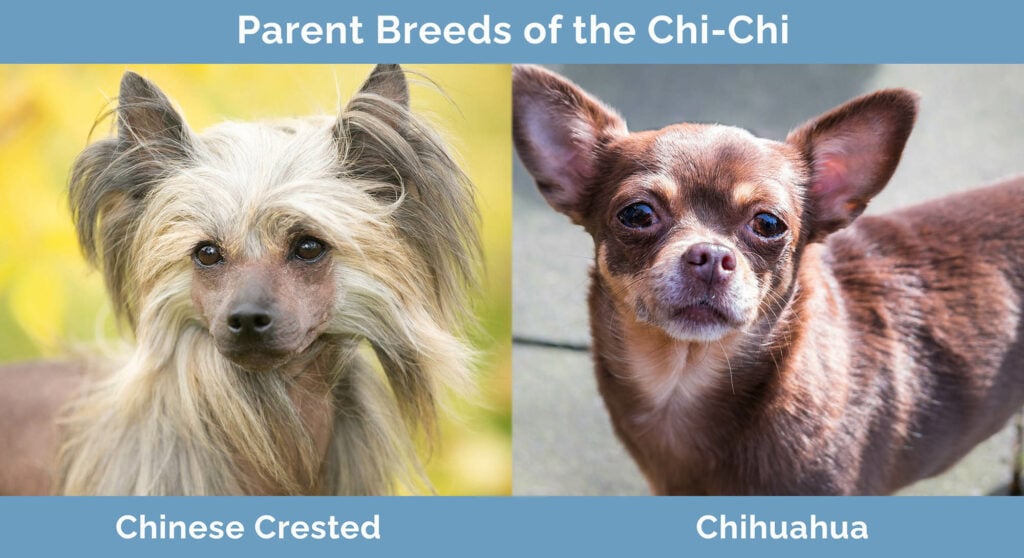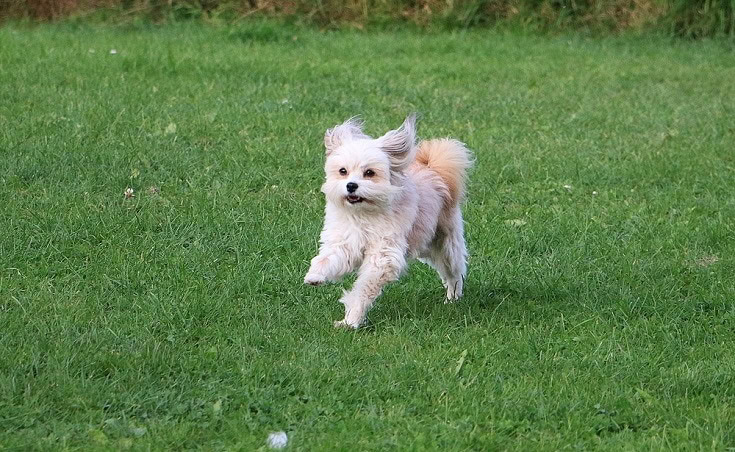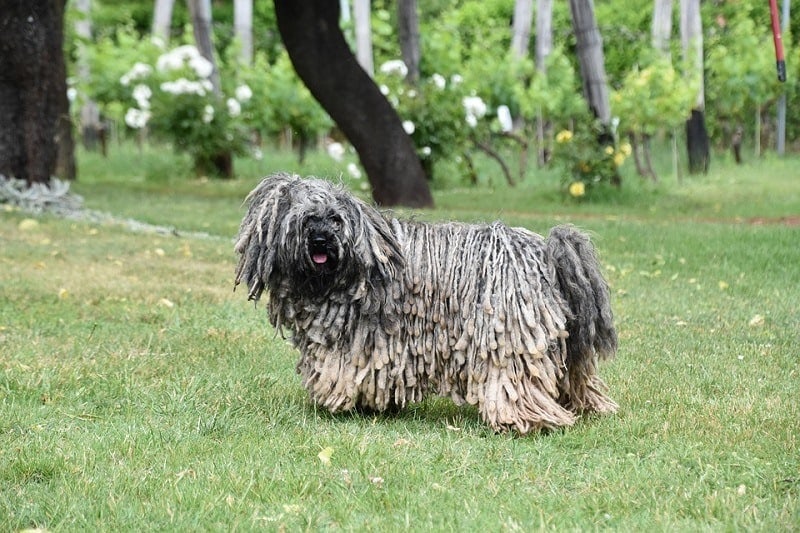Chi-Chi (Chinese Crested & Chihuahua Mix): Info, Pictures, Characteristics & Facts

Updated on

Height:
5-12 inches
Weight:
4-10 pounds
Lifespan:
12-20 years
Colors:
Black, white, fawn, cream, chocolate, golden
Suitable for:
Active families, those looking for a low-shedding dog
Temperament:
Easy to train, loving, friendly, gets along with other pets
The Chihuahua and the Chinese Crested are bred together to create the tiny and adorable Chi Chi. Weighing in at under 10 pounds and standing at no more than 12 inches, these little dogs are the perfect pet options for families in small homes or apartments, as well as older folks who need a friend to spend their time with.
The Chi Chi is smart, fun-loving, affectionate, and a bit mischievous. They don’t mind staying home while their parents work, but they do look forward to plenty of daily attention and love. These dogs play well with children of all ages and enjoy spending time outdoors with human and animal friends. Chi Chis may or may not have hair, depending on which parent they most take after.
While the Chi Chi can be noisy at times, they make great watchdogs, as they’ll happily let you know whenever someone comes onto your property. Chi Chis are great pets all around, thanks to their small size, versatility, sociability, and smarts. Want to learn more about parenting a Chi Chi of your very own? Everything you should know can be found right here in our comprehensive Chi Chi guide.
Chi Chi Puppies
Chi Chi puppies might be super cute and cuddly, but they require commitment, work, and attention. They can’t be left to their own devices all the time. They should never be left outdoors alone, even inside a fenced yard. They’re so small, they could become prey for many wild and domestic animals.
Take into consideration that these small dogs have lots of energy and are very active dogs that will need plenty of playtime, exercise, and mental stimulation activities. Make sure you can meet your Chi Chi’s energy level to avoid boredom.
3 Little-Known Facts About the Chi Chi
1. They Have Tons of Energy
The Chi Chi might be tiny, but that doesn’t mean that they like to lounge around all day. In fact, they have more energy than many medium- and large-sized breeds out there! They require long walks regularly, and they won’t be satisfied with less than 45 minutes or so of vigorous exercise.
2. They’re Excellent Watch Dogs
These little hybrid dogs may not be effective guard dogs, but they sure can keep watch. Any time someone strange enters your property, you can expect your Chi Chi to tell you immediately. They’re always alert and on the hunt for strange noises, people, and humans.
3. They Love Being in a Pack
While Chi Chis do fine in single-pet households, they thrive when allowed to intermingle in a multi-pet environment. They love being a member of the pack, and they rarely look to challenge other dogs for leadership.

Temperament & Intelligence of the Chi Chi 🧠
Chi Chis are lighthearted and friendly, even to strangers who don’t pose an obvious threat. They love spending time with their human and animal family members, and they enjoy learning new tricks. They are a bit mischievous, so keep your slippers and valuables hidden from plain sight. This cute hybrid mix is also energetic and will keep you on your toes all day long if you let them.
These dogs can be left alone at home for a few hours at a time, but never outdoors. Too much time spent alone could result in the development of separation anxiety. Having an animal friend to spend time with makes being without human family members more bearable and enjoyable. Because these dogs are smart, energetic, and inquisitive, they need a firm yet loving hand from their human pack leader.
Are These Dogs Good for Families? 🏡
The Chi Chi is a perfect family pet. They get along with people of all ages, even toddlers. They do need to be socialized and trained at an early age to learn how to interact with humans properly and safely, especially if young children are in the picture. Every member of the household should learn training techniques, such as sit and stay, to ensure obedience, no matter the social situation.
Does This Breed Get Along With Other Pets? 🐶 😽
As mentioned, Chi Chis enjoy the company of most other domesticated animals. In fact, they prefer living in a pack environment where more than one dog or cat is present. They are naturally sociable, but they should be introduced to new dogs on a regular basis to ensure that they don’t become too territorial or aggressive with strange animals. Cats should be introduced to this mixed breed early on, so they can learn how to interact with them while they’re still small.

Things to Know When Owning a Chi Chi
By now, you’ve learned quite a bit about the Chi Chi and what it might be like to own one. But you still need to learn about their eating habits, the training they should go through, and how much grooming you can look forward to committing to.
Food & Diet Requirements 🦴
Even though Chi Chis are highly energetic, they don’t need more than about a cup of food each day to meet their nutritional and energy needs. But the type of food they eat should be made up of high-quality ingredients that include real whole meats and veggies like sweet potatoes and peas. Your Chi Chi puppy should eat food designed specifically for puppies because it provides more protein than adult food to support their rapid growth.
Whether feeding your dog puppy or adult food, it’s a good idea to choose one made just for small breeds. The kibble tends to be smaller and easier to chew, and the nutrients are formulated for optimal digestion and absorption for small dogs such as Chi Chis.
Exercise
Chi Chis need a great deal of exercise every day, or they can become destructive indoors. They’re smart dogs that need to be physically and mentally challenged to feel satisfied. Owners should start their days with long walks to hold their Chi Chi over until they can engage in other activities later. In addition to daily walks, your Chi Chi should engage in outdoor play in the yard or at the dog park and indoor play with puzzle toys and games like hide-and-seek or tug-of-war.
Training 🦮
Chi Chis need to be trained as soon as they come home from the breeder so they can be effectively managed by family members, whether spending time indoors or outside. Obedience training is crucial; otherwise, your Chi Chi will do whatever they want, no matter what their age is. Puppies that aren’t trained to do at least the basic things like come, sit, and stay can be extremely hard to handle when they become adults, even though they’re small.

You may find that a lack of obedience training results in excessive barking, impatience, and an overall mischievous attitude. You can train your dog at home or hire a professional to help you get started. Either way, your pooch will learn valuable skills that help make them a productive part of the family dynamic.
Grooming ✂️
Chi Chis can have no hair, short hair, or long hair, depending on the traits that are taken from each parent breed. Dogs with no hair require little daily grooming, but they do need regular baths to get rid of dirt and dust that hair would typically protect the skin from. Hairless Chi Chis should also be treated with sunblock before spending time outdoors to prevent sunburn and skin disease.
Short-haired Chi Chis might need to be brushed once a week or so to keep them looking clean and shiny. Long-haired dogs should be brushed every day to minimize the risk of mats and tangles. Chi Chis with hair don’t typically need to be bathed, and they certainly don’t need sunblock.
The Chi Chi needs to have their eyes and ears cleaned. The eyes and ears should be gently cleaned with a damp cloth or cotton ball a couple of times a month. These dogs should get enough exercise to keep their nails naturally trimmed, so there shouldn’t be a need to invest in trimmers.
Health Conditions ❤️
There aren’t any major health concerns to worry about as a Chi Chi parent, but there are a few minor issues that you should always keep a lookout for.
- Dry eye
- Patellar luxation
- Lens luxation
- Hypoglycemia
- Progressive retinal atrophy
- Glaucoma
- None to note
Male vs Female
Obviously, there is a genetic difference between male and female Chi Chis. But the truth is that there’s no scientific research that confirms any personality or trait differences between male and female Chi Chis.
However, owners have their own personal experiences to share that include thoughts such as females being easier to potty train and males being more aggressive. However, Chi Chis tend to be affectionate, outgoing, and easy to train in general. You would be lucky to own one of these small yet mighty dogs!
Conclusion
We think that spending time with Chi Chis is worth every second. They’re lovable, energetic, playful, loyal, and super smart. They’ll let you know when someone’s around without your previous knowledge. They will always make you feel better after a stressful day with a long snuggle in bed. Whether you are a family of one or a household of 12, the Chi Chi will fit right into your lifestyle dynamic.
Whether spending time at home or on a camping trip, Chi Chis is the perfect companion for the experience. Are you the proud owner of a Chi Chi, or do you know someone who is? Please, share your thoughts and experiences with us in the comments section below. We look forward to hearing from you!
Remember to replace this with the relevant info for this dog breed!
See Also:
- A Guide to the Chi Spaniel
- Golden Pyrenees (Great Pyrenees & Golden Retriever Mix): Info, Pictures, Facts
Featured Image Credit: Eric Isselee, Shutterstock














